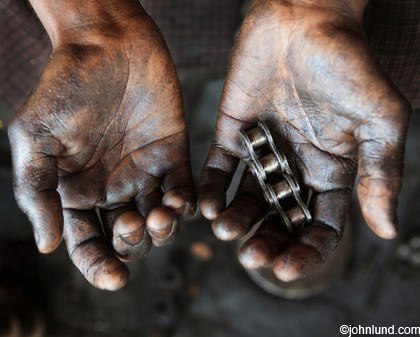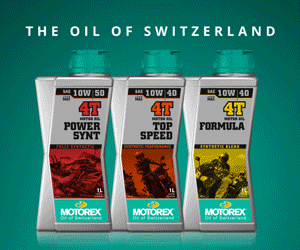A life of grime – A column by Phil Hall
As a young rider I spent inordinate amounts of time working on my bikes. Mostly it was necessary stuff. My extremely limited budget meant that I only ever bought one brand new bike, a Yamaha RD250 in December 1975 for the grand price of $999. Every other purchase was from the second hand market and, for the majority of my riding career, the lower end of the thousands has been my window of opportunity.
And, as my bikes usually tended to be older and my wage tended to be smaller (newly graduated teachers weren’t brilliantly remunerated) the concept of doing my own maintenance became a necessity. I might add that the same applied to my cars and for the same reasons.
Not long after I bought my first bike, a cherry red Honda 350/4 I became aware of a “humming” sound from the transmission. The bike was not that old and should not have had serious bottom end issues, but, acting on the advice of others who I felt sure knew more about the subject than I did, I proceeded to take the engine out of the frame and strip it down to try and find the problem. Looking back on it now, the naivety of me expecting to be able to achieve this still amazes me.
Borrowing the workshop of a garage nearby where a friend worked, I took the engine to the shop and tore it apart. What I found was instructive but ultimately fruitless because, having found nothing untoward (I had been expecting a dud bearing or something) I reassembled the whole thing, put it back in the bike and wasn’t overly surprised to find that the whole operation had achieved absolutely nothing (except, perhaps, to add to my education). The “hum” was still there and remained until I on-sold the bike. Nothing broke, nothing went wrong and it interfered in no way with the running of it. I look back now and scratch my head!!
Nevertheless, the necessity of doing my own maintenance was still there. Before becoming a motorcyclist I had had a number of years doing my own maintenance on my cars and on the cars of friends for the reasons listed above. I shudder now to remember all the hours that I spent on cold concrete garage floors looking up at the underside of greasy, oily motor cars. We cheerfully removed engines, took off heads, did decokes and valve grinds (pardon me if these terms are unfamiliar) all with rudimentary and sometimes borrowed tools nearly always with no recourse to workshop manuals, expert advice or the internet. We did oil changes and greased the numerous nipples that required greasing (make of that what you will) and we even attempted some electrical work, though wiring up driving lights and fog lights was about my limit there (never have been able to understand electrics).
Pretty much anything that needed doing we would do. I have replaced universal joints on the side of the road, taken radiators out and repaired them and put them back while miles from home and even done some panel beating when the need arose.
And, when it came to my bikes, the same pretty much applied. It was only many years later, in fact not that long ago, that I was in the position to be able to entrust the majority of work on my bikes to my mechanic. I don’t think I was that popular with Rick and others as I often watched as they worked on the bike. Mechanics just hate that.
But, looking back on it, do I regret it? Of course not. To begin with, had I not applied myself to the increasingly more complex tasks of motorcycle maintenance, I would never have been able to ride for the distances and time that I have been able to.
What did I learn from my life of grime? All sorts of things.
I learned how a motorcycle works. Having always been mechanically-minded, there wasn’t much about how a bike works about which I didn’t already have a basic grasp. But bikes ARE different to cars in many important ways and having to work on my own bikes refined that knowledge and made me a better mechanic. Was this just an end in itself, though? Was it really that important? Could I have achieved all that I have without ever having lifted a spanner? Possibly, indeed, probably. But the mechanical knowledge contributed vastly to something with which I have always prided myself, mechanical sympathy. If you know how something works, you are much more likely to use it wisely and, should the need be, carefully.
Knowing the “innards” of your motorcycle allows you to be much more aware of what it is doing and why it is doing it. I makes you more sensitive to potential problems and enables you to identify and possibly forestall potential difficulties. If you spend a lot of time on the road and far from home, this becomes even more advantageous.
Some may say that this kind of knowledge is easily accessible on the internet and even on the road far from home if your phones is capable and this is true. But, as always, there is no substitute for personal experience.
I learned patience. The acquisition of this trait has not been solely because of my life of grime, but it certainly has helped. WD40 WILL penetrate the rust and grime and allow you to loosen that cantankerous nut. But it won’t do it straight away; in most cases you have to WAIT for it to do its job. If the casing is secured by eight bolts you may be sure that seven of them will undo easily but that one of them (usually the last one you attempt to undo) will not. Be patient, don’t risk damaging the bolt head, your spanner or yourself by trying to force it. Oil, even pre-warmed oil, will not all flow out of the sump in an instant and allow you to press on with the oil change (and that goes double if you are changing the filter). Bleeding brakes can be tedious and annoying but you will do it best if you are patient. In just about every area of maintenance there are aspects of the job that simply can’t be hurried. So don’t hurry. Use the enforced waiting to check over other areas of the bike or go away and prepare for the next part of the job.
Motorcycle maintenance (and lots of other life experiences) taught me a lot about frustration and how to handle it. When the last nut that you are securing drops off the bolt and makes its way somewhere deep within the fairing that you have just re-attached, frustration levels can reach painful heights. This is doubly so if the only way to retrieve the nut is to remove said fairing so that access to the offending part can be achieved. Actually, this scenario relates to “patience” above as well, doesn’t it? Step back, breathe and allow a cool head to perhaps devise a better solution.
My life of grime taught me a lot about process. Some maintenance tasks can be completely random, but, for the most part, there is an order that should be followed so that the task is completed quickly and efficiently. Nothing teaches you more about process than having to half take the bike apart after you thought you were finished because you neglected the part of the job that was #3 on the list. Watching fresh oil pouring out of the sump into the pan of old oil because you forgot to replace the sump plug before you added the new oil is another example of the breakdown of process.
In a similar vein, motorcycle maintenance is great for your memory. Here I must confess that I am still learning. A good mate who has now passed on admitted once in a candid moment that he was great at taking things apart but appallingly bad at putting them back together, and he was right, too. I still have lapses in this area and I have found that laying out the parts on the bench in the order in which they were taken apart certainly helps. While taking part in the restoration of the Shadowfax I found that a digital camera is a great asset in helping you remember what components go where. In a similar fashion, keeping like parts with like parts in ziplock sandwich bags is also a clever aid to memory. I continue to be extremely envious of the many great mechanics I have watched who need none of these aids, but unfailingly remember which part belongs where and which way it should be reattached.
A life of grime can teach you about beauty. Surely there are few things more beautiful than a piece of engineering that just works? Getting down to the nitty gritty of my bikes has enabled me to appreciate to a much deeper level just what a wonderful machine a motorcycle is. Now I’m not going to get into Zen and the art of motorcycle maintenance, but there IS a beauty in engineering and working on your own bike rather than allowing others to do it allows you to discover that beauty.
A life of grime can teach you a lot about all sorts of other life skills; time management, dealing with the guy behind the counter who doesn’t understand that you have a ride on this weekend and it isn’t satisfactory that the part you need isn’t due till next Tuesday (see “patience” above). It can teach you that everything has a purpose and that it works best if your approach to it is in line with that purpose rather than working against it (I’m getting Zen again, aren’t I?) And it can help teach you that things mostly happen for a reason and that that reason may not be immediately apparent.
It can teach you to accept defeat gracefully and to rejoice in success. It provides, like some other life endeavours, the most exhilarating sense of achievement when it just works out right. It can make you look brilliant and it can make you look very ordinary indeed; but mostly it teaches you more about yourself than it does about the inanimate object on which you are working.
It is so convenient to let the mechanic do the job, and there are some of the sophisticated ones (especially in modern bikes that depend so much on electronics) that should be left to the very skilful and the very well trained. But getting to know your bike while getting grease under your fingernails has benefits that cannot be found by dropping the bike in in the morning and picking it up in the afternoon.
There is, indeed, something to be said for a life of grime.
























